University of Canberra/OpenUC
< University of Canberra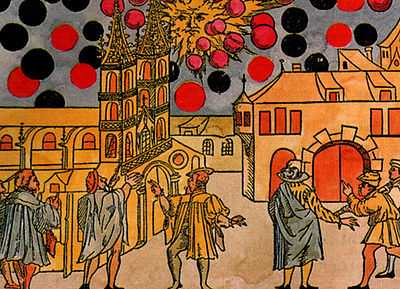
| | Completion status: this resource is ~25% complete. |
If our people, communities and cultures are to be increasingly documented and represented through the Internet [1], if our "markets are conversations"[2], if civic organisation is now possible without institutions[3], and if concerns of amateurisation are substantial[4], then our academics and universities may have a critical role to play in monitoring, understanding and informing these challenges and changes. But perhaps not before academics and universities themselves reconsider the status of their own traditions, systems and assumptions[5]. For example, we may need to go as far as reconsidering the nature of the problems that universities are tasked to solve, and ensure that they have not inadvertently become part of those problems, or new problems entirely[6]. OpenUC then, is a project looking to support people who are exploring and testing new ideas and opportunities - primarily for the University of Canberra, in its changing social and economic context.
Summary
OpenUC is a vision that refers to the work of leading social scientists, theorists and commentators, for creating conceptual space and proposing new directions for Australian universities to develop and meet their present day challenges. It will attempt to arrest the adverse consequences of academic capitalism[7] by exploring academic practices that attempt to draw on the wealth of networks, crowd resources, and open source economics[8]. Through the development and testing of policies, procedures and practices we expect to find more appropriate ways to engage with information, communication, and communities, for research, teaching and learning.
OpenUC proposes that Open Academic Practices be developed by the University of Canberra to establish a significant point of difference in its research and development[9], and that a Culturally Grounded Professional Paradigm in educational services and community engagement be developed to better prepare people for work and citizenship internationally[10][11].
This proposal outlines considerations and steps required to begin such development, pointing out not only the benefits, but the risks as well, and will outline what policy, procedures, academic and professional practices and support services would need to look like.
Background
Leigh Blackall and James Neill have been working together at the University of Canberra, promoting awareness, support, capacity and policy around open academic practices. The University of Canberra's Office of Development and Engagement invited them to speak at the Knowledge Commercialisation Australasia Annual Conference 2010, 9-11 Nov 2010, where they presented the ethical framework and operational principles behind Open education and research at the University of Canberra. Seperatley, the University of Canberra's Deputy Vice-Chancellor Education has requested a development proposal and plan for open academic practices at the University.
What is a university for?
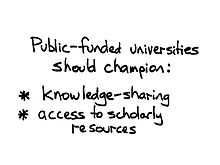
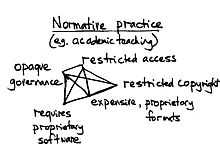
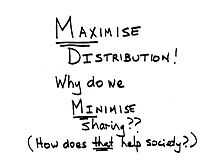
Values of a university
- Centralised expert knowledge
- Independent critical thought and investigation
- Educated, informed public
- Vocational training
- Liberal education
- Academic capitalism[?]
- notes
- Humboldt’s University of Berlin, established in 1815 as the first modern European university. A central feature of Humboldt’s university was linking research and teaching as the fundamental principle for a progressive liberal-humanist pedagogy.[12]
- Central to the work of reinventing the undergraduate curriculum was the work of Ernest Boyer, who highlighted the imbalance between research and teaching in research intensive universities in the US. Boyer argued for a reconfiguration of teaching and research with teaching recognised as an important and fundamental part of academic life.[13]
- Together Benjamin and Vygotsky establish the key principles for a pedagogy for the avant - garde: that students are the subjects of the intellectual process of teaching and learning, and that a progressive pedagogy involves reinventing the politics of production from within, against and beyond the current social relations of capitalist production. The issue for them is not simply how do students learn, but how do radical intellectuals teach?[14]
- For Vygotsky it is meaningless to have abstract ideals for the student, e. g., ‘the indivisible and harmonious personality’ or the ‘educated and civilised person’, as this says nothing about the politics and ethics of the social system out of which the education process is derived (Vygotsky 1997).[15]
- Activity is ongoing to redefine the relationship between humanity and technology in, against and beyond the university (Dyer-Witherford, 1999), including the redesign of capitalist labour through hacking and other forms of co-operative working (Wark, 2004), the creation of Open Educational Resources (Downes, 2009; Hall, 2010) and the intellectual collaborations sited within the burgeoning practice defined as the Academic Commons and Commonism (Dyer-Witherford, 2007).[16]
- The underlying purpose of Student as Producer is to intellectualise teaching and learning in higher education, challenging the liberal humanist, and increasingly discredited notion of the neo-liberal university, to confront its own revolutionary intellectual culture and tradition by engaging with critical social theory (McLean 2006). In the current context this means not simply discussing education as an economic and funding crisis, but also as a political crisis, within which indifference to the political implications of the neo-liberal (enterprise) university is not an option (Vygotsky, 1997).[17]
- So in answer to the question ‘How do revolutionary teachers teach?’ The response must be through interruption and astonishment, experiments with history, deconstructing the capitalist labour process by reconnecting intellectual and manual labour, and by creating Zones of Proximal Development. In other words, not teaching - so that we all might learn.[18]
- [Higher education is the...] "mass production of people literally unfit for anything except to take part in an elaborate and completely artificial charade."[19]
- Research has shown that the theories, or mental models, people use in practice are, for the most part, tacit. Few people are consciously aware of them. It is these unquestioned theories-in-use that often guide our actions and strategies not our espoused theories. (Argyris and Schon, 1974, Argyris, 1980, Argyris, 1987, and cited in Smith, 2001) Thus, quite often the world-view and values we espouse are not the world-view and values implied by our behavior. This is not just a difference between what we say and what we do (between theory and action) but between two different theories of action—-one we profess and one we actually use.[20]
- Academic capitalism is defined as “institutional and professorial market or market-like efforts to secure external moneys” (Slaughter and Leslie, 1997, p. 8). In the 1980s and 1990s academic capitalism flourished as government support for education declined, corporate interest in new products and processes coincided with the university’s search for increased funding, and as the government sought to enhance national competitiveness by linking postsecondary education to business innovation... Public higher education institutions became dependent on sources beyond the government and that process is already changing the roles, rewards, and structures within academic institutions.[21]
What is Open UC?
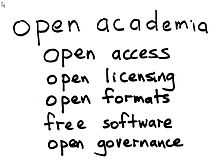
- Promoting the role of a university
- Open academic principles (as set out in Open education and research at the University of Canberra).
- Professional Paradigm (Butson 2011)
- Enveloped education (short courses and community engagement to the front, leading into degrees and long term course programs if required)
- Culturally grounded and ecologically justified (Bowers 2005)
- Addressing problems in Academic capitalism[22]
- Confronting the challenge of Webism[23]
- notes
- Three years later, Blok was dead, and Vladimir Mayakovsky, the tribune of the Revolution, wrote his obituary. “Blok approached our great Revolution honestly and with awe,” Mayakovsky wrote. But it was too much for him: “I remember, in the first days of the Revolution, I passed a thin, hunched-over figure in uniform warming itself by a fire near the Winter Palace. The figure called out to me. It was Blok. We walked together. . . . I said, ‘How do you like it?’ ‘It’s good,’ said Blok, and then added: ‘They burned down my library.’”[24]
- the internet was no mere fax machine.1 From the first, and in no small part because of its fervent supporters, it has felt less like a technology and more like a social movement—like communism, like feminism, like rock and roll. An ideology we could call webism. While the rest of us look up movie times, buy sweaters, and post jihadi videos, the webists proclaim the new age.[25]
- And as Fred Turner—a communications professor at Stanford—has convincingly argued, it is a mixture of the technophilia of Stanford and the countercultural ethos of San Francisco that has created the ideology of the web as we know it.[26]
- If I had to pick the critical technology for the 20th century, the bit of social lubricant without which the wheels would've come off the whole enterprise, I'd say it was the sitcom. [...] For the first time, society forced onto an enormous number of its citizens the requirement to manage something they had never had to manage before--free time. And what did we do with that free time? Well, mostly we spent it watching TV. [...] And it's only now, as we're waking up from that collective bender, that we're starting to see the cognitive surplus as an asset rather than as a crisis. We're seeing things being designed to take advantage of that surplus, to deploy it in ways more engaging than just having a TV in everybody's basement.[27]
- The members of the Invisible College did not live to see the full flowering of the scientific method, and we will not live to see what use humanity makes of a medium for sharing that is cheap, instant, and global (both in the sense of 'comes from everyone' and 'goes everywhere.') We are, however, the people who are setting the earliest patterns for this medium. Our fate won't matter much, but the norms we set will. Given what we have today, the Internet could easily become Invisible High School, with a modicum of educational material in an ocean of narcissism and social obsessions. We could, however, also use it as an Invisible College, the communicative backbone of real intellectual and civic change. [28]
- The first ones the internet revolution came for were the travel agents, those nice people who looked up flight times and prices for you on a computer, before you could do it yourself at home. Then Captain Kirk returned from the future to zap them all. Next to fall was the music industry... And then the internet came for the print media. This process has been longer, more intricate, and more emotionally fraught than the interaction of the internet with any other media.[29]
- Walter Benjamin spoke of “modern man’s legitimate claim to being reproduced” by film, a claim denied modern man by the capitalist film industry; James Joyce’s Leopold Bloom lamented the fact that the wisdom of the street found no outlet in literature. Now, through a million open channels, the wisdom of the people is represented, and they can write back to power—or at least to posters of YouTube videos. [30]
- Webism was born as a technophilic left-wing splinter movement in the late 1960s, and reborn in early ’80s entrepreneurial Silicon Valley, and finally fully realized by the generation born around 1980. Whether in its right-leaning libertarian or left-leaning communitarian mode it was against the Man, and all the minions of the Man: censorship, outside control, narrative linearity. It was against elitism; it was against inequality. But it wasn’t against culture.[31]
Open Academia

- Open education and research to be promoted as standard procedure, making closed and restricted education and research the exception...
- Recognition, incentives and rewards for staff practicing Open academia...
- Develop more flexible and holistic study and assessment procedures that compliment open eduction and informal learning practices...
- Work towards free education...
- Networked learning (and research)
Intellectual Property
- Staff and students retain full ownership of their IP...
- Creative Commons Attribution default...
- UC to provide support, training and education services on matters IP...
- Indigenous autonomy...
- notes
- The University of Canberra appreciates its role in society for research, development, teaching and learning. Intellectual work is core to that role. The free and open sharing of knowledge and scholarship remains the most effective way to further the effectiveness of that work. The University of Canberra will promote the free and open sharing of intellectual work.[32]
- The policy is a fascinating text – it looks like it may be a bit of a benchmark if it goes through.[33]
Free and open media
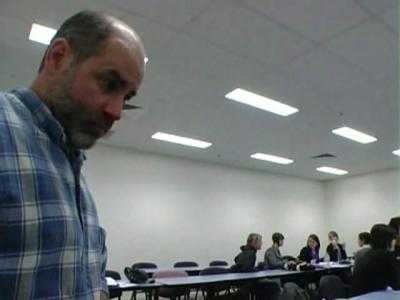
- Preference the use of free software...
- Promote use of, and ensure archival in, open standard formats...
- Avoid provision or prescription of platform... encourage independent computing
- Work towards free and open provision of network connection...
- Distribute media out, to National Libraries and Archives, to International repositories, and to popular social media channels...
Support, incentives and rewards
- PDR
- Academic performance measures
- Teaching performance measures
- Engagement performance measures
- Strategic investment fund
Marketing
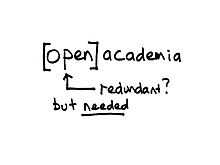
- Production of open educational resources in partnership with TLC and UCUMPS...
- ROI...
- Production schedule...
Library
- IP support...
- Open academia support...
- Open Educational Resources...
- Repository of open education and research resources, forwarded to the Australian National Library, Australian National Archives, Internet Archive, Wikimedia Commons, and popular social media channels...
Information Communications Technology
- Support for free software...
- Use of and contributions to open source software development...
- Provision of software services to Library...
- Academic outputs with Information Science and Engineering such as...
Teaching, Research and Community Engagement
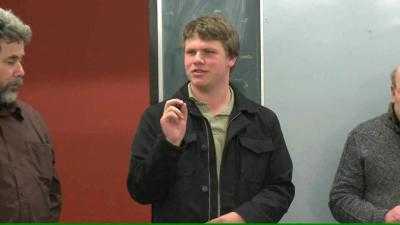
- Adult and Community education
- Night classes and short courses
- Enveloped learning
- Support and research to open academic practices...
- Conference support and coordination...
- Production of open educational resources in partnership with Marketing
Why OpenUC?
- How it fits with strategic directions...
- Where it will lead us beyond 2012...
- What UC will become...
- Significant and national and international trend
- The Commission of the European Communities... Hereby recommends that member states should: 4. Promote the broad dissemination of knowledge created with public funds, by taking steps to encourage open access to research results, while enabling, where appropriate, the related intellectual property to be protected; ...[34]
- FRPAA would require that 11 U.S. government agencies with annual extramural research expenditures over $100 million make manuscripts of journal articles stemming from research funded by that agency publicly available via the Internet.[35]
- 6.3 Consistent with the need for free and open reuse and adaptation, PSI released should be licensed under the Creative Commons BY standard as the default. AGREED IN PRINCIPLE. The Freedom of Information (Reform) Bill 2009 and the Information Commissioner Bill 2009 (the FOI Reforms) will create a new framework through which government information is published and managed.[36]
- We recognise that the Internet has enabled creativity and innovation, the sharing of knowledge, citizen engagement and democracy, and is an engine of economic growth and opportunity. This is the result of certain attributes of the Internet: its open protocols and its generativity; the fact that anyone can connect and anyone can build new applications, and find new uses without discrimination. ACTA should preserve these attributes.[37]
- New Zealand Government Open Access and Licensing (NZGOAL) framework
- Unlocking IP: New models for sharing and trading IP, UNSW
- Intellectual Property: Knowledge, Culture and Economy, QUT
- News article focusing on Copyright Agency Limited
- News paper article about journal profits
- Social Capital and Capitalist Economies
- The Tragedy of the Commons (Not the book) by Marco Fioretti 2009
Problems
- Staff have no time or inicentive to appreciate or develop open academic practices
- Current UC Policy, infrastructure, culture and practice is deeply embedded with closed academic practice
- Student expectations and prior learning experience is based on closed academic practice
- Few Australian institutions have considered or taken this route
- It is financially difficult to encourage open practices, because all costs, including social and ecological, are not yet accounted for
- Paradigm shift proposal: What Is This Thing Called Science? Chapter 8 - Theories as Structures 1
- The Open Society and Its Enemies
- Neo colonialism, cultural imperialism and a decoupling of expert and traditional knowledge custodian from the information that revolves around them.
References
- ↑ Keith Gessen, Mark Greif, Chad Harbach, Benjamin Kunkel, Allison Lorentzen, Marco Roth ("The Editors"). The Internet as Social Movement. n+1, 23 April 2010
- ↑ Rick Levine, Christopher Locke, Doc Searls, and David Weinberger. The Cluetrain Manifesto Perseus Books, 2000.
- ↑ Clay Shirky. Here Comes Everybody, Penguin Press, 2008
- ↑ Andrew Keen. The Cult of the Amateur: How Today's Internet Is Killing Our Culture. Currency, 2007
- ↑ Anya Kamenetz DIY U: Edupunks, Edupreneurs, and the Coming Transformation of Higher Education. Chelsea Green Publishing, 2010
- ↑ Kevin Kelly. The Shirky Principle. The Technium, April 2010. Mike Masnick. Institutions Will Seek To Preserve The Problem For Which They Are The Solution. Techdirt, April 2010. James Grimmelmann. The Shirky Principle. PrawfsBlawg, April 2010.
- ↑ Susan M. Awbrey. Making the 'Invisable Hand' Visable: The case for dialogue about Academic Capitalism. The Oakland Journal, Spring 2003 - Issue Number 5
- ↑ Yochai Benkler. The Wealth of Networks: How Social Production Transforms Markets and Freedom. Yale University Press, 2006
- ↑ Blackall, L. Neill, J. (2010). Open education and research at the University of Canberra. Knowledge Commercialisation Australiasia, 2010 Annual Conference
- ↑ Butson, R. (2011). Does higher education need deschooling? Industry and Higher Education, June 2011
- ↑ Bowers, C. (2005). Educating for a Sustainable Future: Mediating Between the Commons and Economic Globalization. http://www.cabowers.net
- ↑ Mike Neary. Student as Producer: A Pedgogy for the Avant-Garde, P2. Learning Exchange, Vol 1, No 1 (2010)
- ↑ Mike Neary. Student as Producer: A Pedgogy for the Avant-Garde, P2. Learning Exchange, Vol 1, No 1 (2010)
- ↑ Mike Neary. Student as Producer: A Pedgogy for the Avant-Garde, P3. Learning Exchange, Vol 1, No 1 (2010)
- ↑ Mike Neary. Student as Producer: A Pedgogy for the Avant-Garde, P6. Learning Exchange, Vol 1, No 1 (2010)
- ↑ Mike Neary. Student as Producer: A Pedgogy for the Avant-Garde, P7. Learning Exchange, Vol 1, No 1 (2010)
- ↑ Mike Neary. Student as Producer: A Pedgogy for the Avant-Garde, P7. Learning Exchange, Vol 1, No 1 (2010)
- ↑ Mike Neary. Student as Producer: A Pedgogy for the Avant-Garde, P9. Learning Exchange, Vol 1, No 1 (2010)
- ↑ Thomas Merton, quoted by David Orr. What is Education for? Six myths about the foundations of modern education, and six new principles to replace them. In Context number 27: The Learning Revolution, 1991
- ↑ Susan Awbrey. Making the 'Invisable Hand' Visable: The case for dialogue about academic capitalism. Oakland University Journal, Spring 2003 - Issue Number 5
- ↑ Susan Awbrey. Making the Invisible Hand Visible. The Case for Dialogue About Academic Capitalism. Oakland University Journal, Spring 2003 - Issue Number 5
- ↑ Susan M. Awbrey. Making the 'Invisable Hand' Visable: The case for dialogue about Academic Capitalism. The Oakland Journal, Spring 2003 - Issue Number 5
- ↑ n+1 Editors, Internet as Social Media: A brief history of webism. n+1 April 2010
- ↑ n+1 Editors, Internet as Social Media: A brief history of webism, n+1 April 2010
- ↑ n+1 Editors, Internet as Social Media: A brief history of webism, n+1 April 2010
- ↑ n+1 Editors, Internet as Social Media: A brief history of webism, n+1 April 2010
- ↑ Clay Shirky. Gin, Television, and Social Surplus (video of the talk), April 2008.
- ↑ Clay Shirky. "The Shock of Inclusion", in The Edge Annual Question — 2010: How Is the Internet Changing the Way You Think?, January 2010
- ↑ n+1 Editors, Internet as Social Media: A brief history of webism, n+1 April 2010
- ↑ n+1 Editors, Internet as Social Media: A brief history of webism, n+1 April 2010
- ↑ n+1 Editors, Internet as Social Media: A brief history of webism, n+1 April 2010
- ↑ Leigh Blackall and James Neill. Proposed policy for intellectual property. Wikiversity, september 2010
- ↑ Jen Kwok. Response from NTEU to the proposed IP Policy. Wikiversity, September 2010
- ↑ Peter Suber. EC recommends OA for publicly-funded research. Open Access News, April 22, 2008
- ↑ the Scholarly Publishing and Academic Resources Coalition. The USA Federal Research Public Access Act. Retrieved in October 2010
- ↑ the Minister for Finance and Deregulation. Australian Minister for Finance and Deregulation response to Task Force Gov2.0. Ministry for Finance and DeregulationMay 2010
- ↑ The participants at the PublicACTA Conference. The New Zealand Wellington Declaration to ACTA. PublicACTA Blog: April 11, 2010
Links
- Universities as Critic and Conscience of Society: The Role of Academic Freedom
- Academic capitalism
- Open academia
- Networked Learning
- Social Media
- The role of marketing in educational development
- Government Response to the Report of the Government 2.0 Taskforce
- Active support for engaging with popular media for research, teaching and learning, by removing technical and cultural barriers, and putting in place solid support, incentives and rewards.
- How public education should provide ROI on my tax dollars
- Provision of free and open connectivity (especially wireless) on campus and in key regional centres
- Some provision and participation in FOSS development and support
- Default copyright license of Creative Commons Attribution, with some and all-rights-reserved options set at 1, 3, 5, 10 years to better manage IP toward open academia
- Assume a leadership role for open education and research in Australia
- Open Education Practices: A User Guide for Organisations